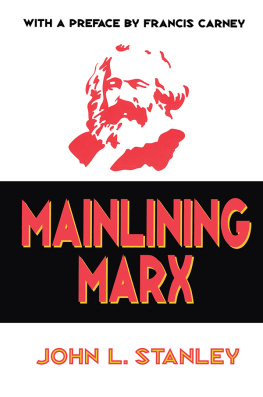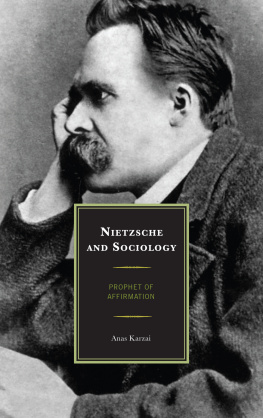ROUTLEDGE LIBRARY EDITIONS: SOCIAL THEORY
Volume 42
MARX AND MEAD
First published in 1980
This edition first published in 2015
by Routledge
2 Park Square, Milton Park, Abingdon, Oxon, OX14 4RN
and by Routledge
711 Third Avenue, New York, NY 10017
Routledge is an imprint of the Taylor & Francis Group, an informa business
1980 T. W Goff
All rights reserved. No part of this book may be reprinted or reproduced or utilised in any form or by any electronic, mechanical, or other means, now known or hereafter invented, including photocopying and recording, or in any information storage or retrieval system, without permission in writing from the publishers.
Trademark notice: Product or corporate names may be trademarks or registered trademarks, and are used only for identification and explanation without intent to infringe.
British Library Cataloguing in Publication Data
A catalogue record for this book is available from the British Library
ISBN: 978-0-415-72731-0 (Set)
eISBN: 978-1-315-76997-4 (Set)
ISBN: 978-1-138-78617-2 (Volume 42)
eISBN: 978-1-315-76352-1 (Volume 42)
Publishers Note
The publisher has gone to great lengths to ensure the quality of this reprint but points out that some imperfections in the original copies may be apparent.
Disclaimer
The publisher has made every effort to trace copyright holders and would welcome correspondence from those they have been unable to trace.
First published in 1980
by Routledge & Kegan Paul Ltd
39 Store Street, London WC1E 7DD,
9 Park Street, Boston, Mass. 02108, USA and
Broadway House, Newtown Road,
Henley-on-Thames, Oxow RG9 1EN
Set in Linotron 202 Garamond 10 on 12pt by
Input Typesetting Ltd, London
and printed in Great Britain by
Redwood Burn Ltd
Trowbridge & Esher
T. W. Goff 1980
No part of this book may be reproduced in
any form without permission from the
publisher, except for the quotation of brief
passages in criticism
ISBN 0 7100 0464 8
Contents
The insight that has inspired the development of sociologies of knowledge, namely, the idea that thought and social context are integrally related, has become quite commonplace. It is present, if only implicitly in most of sociology, in the disciplines of psychology and linguistics and informs contemporary perspectives in the philosophy and history of science. Perhaps the clearest indication of the acceptance of this insight on at least a common-sense level is to be found in our editorial pages which increasingly speak of social and political conflicts less as matters of ignorance and power and more as matters involving cultural and sub-cultural difference.
But though the suspicion that ideas are fundamentally social in nature is becoming a virtual assumption in our approaches to a wide range of issues and topics, the effort to elaborate and clarify this assumption and to ground it in a cogent and acceptable theoretical framework has not yet been successful. Efforts to elaborate the insight and to achieve the necessary grounding are many and diverse. Indeed, few if any of the major figures in the development of sociology from Comte to Parsons or from Marx to Habermas have not attacked this question. The reason for this is obvious: sociology is rooted in the assumption that persons are social beings, and the elaboration of this general assumption forces one to attend to the nature of the relationship between mans thought and the social context of his consciousness. However, in response to these efforts, a highly unified and very definite critique has developed which ultimately denies the theoretical and empirical possibility of a sociology of knowledge in any but the most limited sense.
The reasons for this critique are equally obvious to anyone who has the slightest acquaintance with the debate. The belief that knowledge and social context are integrally related seems to carry an epistemological implication which is simply not acceptable in the mainstream of Western thought: the implication that all thought is relative, and thus that truth is an impossibility. In response to the critique, sociology has on the whole retreated from the radical implications of the insight. The sociology of knowledge remains a weak area within the discipline and generally accepts an extremely limited character.
This study concerns itself with this one-sided debate between critics and proponents of the sociology of knowledge. More specifically, it attempts to rekindle the debate and redress the balance by proposing the outlines of a possible solution to the issue of relativism, a solution which emerges through a synthesis of insights generated by Karl Marx and G. H. Mead. Many have proposed the potential of this synthesis for sociology and for the sociology of knowledge in particular; few have actually explored the possibility and none have done so in the necessary depth.
This work has of course benefited from a number of people, but from these in particular: from Roy Hornosty, a former teacher who has stimulated so many with an awareness of the pressing need to reconsider and reformulate traditional issues in the discipline; from Dick Brymer, another teacher whose interest in Mead was obviously infectious; from Terry Gillin, a friend and colleague whose concerns and arguments stimulated many of the ideas in this work; and lastly, from the students of the Tuesday night seminar at Mount Allison whose enthusiasm, constant questioning and insightful analogies stimulated many clarifications and revisions of the initial formulation of the argument.
I would like to dedicate this book to them and to my family.
It has been suggested by many writers, though often for very different reasons, that the problems facing the development of the sociology of knowledge might be resolved through a synthesis of the insights of Karl Marx and the American social pragmatist, George Herbert Mead. This suggestion has never been pursued in anything approaching the necessary detail, yet its promise becomes increasingly important and for a number of reasons.
Of all the areas within sociology, the sociology of knowledge is of essential importance and yet seems to present the greatest number of difficulties and to have achieved the least. The elaboration of the guiding assumption underlying the discipline as a whole that persons are fundamentally social in nature demands a clear, precise and useable elaboration of the specific and important relationship between our sociality and our consciousness. Despite this fundamental importance, however, it must be admitted that much less agreement has been reached in this particular area than in any other branch of the discipline as a whole. Furthermore, though sociology itself has gradually gained credibility and acceptance despite its failure to achieve a single and generally agreed upon paradigm, the sociology of knowledge has remained highly suspect. Its various efforts continue to be subjected to the strongest and most persistent criticism from both within and without the sociological enterprise.
The basic, most damaging and persistent criticism is that none of the conceptual frameworks so far developed has managed to deal adequately with the apparent relativistic and self-contradictory implications of the insight that human consciousness, knowledge and social factors are somehow integrally related. Most, if not all of the major figures in the area, including Marx and Mead, have contributed to the elaboration of the basic insight and thus to the development of a social theory of knowledge. However, every attempt to take the insight beyond common-sense appreciation and unquestioned assumption is demonstrably deficient with respect to this and to other less basic problems.







